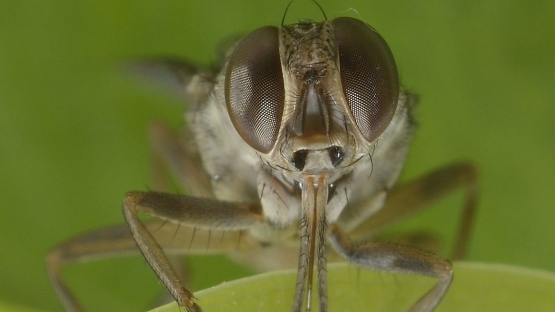A project in Senegal to eradicate tsetse flies that is supported by the FAO/IAEA was recently selected as one of 18 Best Sustainable Development Practices on Food Security at the EXPO Milano 2015. The project was selected among 749 projects for its contribution to furthering sustainable development of small rural communities in marginal areas: it has successfully improved food security and public health in target areas of Senegal through reducing the tsetse fly population by up to 95% using nuclear and other techniques.
Tsetse flies are blood-sucking insect pests threatening food security in the Niayes, a coastal area south east of Dakar. Their bites jeopardize livestock health, and the flies themselves transmit parasites that carry a life-threatening infection to livestock known as African animal trypanosomosis or nagana. These flies can lower quality of life and lead to a loss of milk and meat provided by livestock, which significantly impacts farmers’ livelihoods and stifles local development.
To manage this problem, the Government of Senegal, with the technical cooperation and financial support of the IAEA, the Food and Agriculture Organization of the United Nations (FAO), the French Agricultural Research Centre for International Development (CIRAD) and the USA under the Peaceful Uses Initiative, set out in 2005 to use insecticides and the sterile insect technique (SIT), a form of insect birth control involving ionizing radiation, to eradicate the tsetse fly in the Niayes. Check out this short animation to learn more about SIT and how it works.
How it was done
The target area was divided into three blocks, and the project has successfully eradicated the fly population in the first block, and in the second block has reduced the presence of flies by more than 95%. The implementation of the technique will also be initiated in the third block late this year or early next year. The overall number of trypanosomosis cases in the region has gone down from 40% to 10%, paving the way for local farmers to replace their current lost bovine herds with a more productive and higher yielding breed of cattle.
The Senegal Minister of Livestock, together with Baba M. Sall of the Directorate of Veterinary Services (SDV) and Momar Seck of the Senegal Institute of Agricultural Research received the award on behalf of the project during the Milan EXPO the week before last. The award is part of a programme to raise awareness and spread the best scientific solutions for improving food security and sustainable development, in conjunction with the ‘Feeding the Planet, Energy for Life’, EXPO Milano 2015 — a six month international showcase highlighting the importance of food security in developing regions and the application of science to achieve these aims.
“We are honoured to be recognized alongside such diverse and innovative projects as part of this important award programme,” said Sall. “This award helps us to raise awareness about how nuclear and other techniques can be used to improve food security worldwide. We hope our success with eradicating tsetse flies in the Niayes area continues and can be a source of scientific solutions and inspiration for Senegal and other African countries to achieve their sustainable development goals.”
Other interesting news: tracking food fraud using nuclear techniques
Among other notable events at the EXPO, Andrew Cannavan, Head of the Food and Environmental Protection Laboratory at the Joint FAO/IAEA Division of Nuclear Techniques in Food and Agriculture, gave a presentation on international cooperation to combat food fraud during the event on Fighting Food Crime — Enforcing Food Safety from 9 to 10 July. His presentation focused on using nuclear techniques to uncover threats associated with food fraud, which is the deliberate misrepresentation of products on labelling, packaging of foodstuffs or alterations thereof for illicit economic purposes.
The EXPO Milano is taking place from 1 May to 31 October 2015 and involves United Nations organizations and globally hundreds of other international and non-profit organizations.
We hope our success with eradicating tsetse flies in the Niayes area continues and can be a source of scientific solutions and inspiration for Senegal and other African countries to achieve their sustainable development goals.




